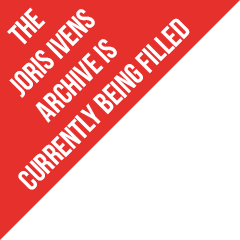

Award winning Canadian documentary filmmaker Peter Davis presented his documentary Digging the Spanish Earth. Thanks to his interviews with Joris Ivens, Martha Gellhorn, Helen van Dongen and George Seldes, this film is of historical importance itself. Peter Davis also revisited locations in Madrid and Fuentedueña de Tajo where The Spanish Earth was shot in spring 1937.
Digging the Spanish Earth presents a clear narrative and structure with the history of the Spanish Civil War (1936-1939) and the production of the icon of documentary film: Ivens’ The Spanish Earth (1937). The selected news reel footage as well as the cross cutting between clips from the original film and the revisit tour of Peter Davis in Madrid and Fuentedueña de Tajoa make it a vivid, clarifying and moving film.
The most striking aspect which elevates the film to an historical important document itself is the number of interviews with eye witnesses of the shooting of the film: Joris Ivens himself, Helen van Dongen (editor), Martha Gellhorn (journalist) and George Seldes (journalist). These interviews on film were already shot in 1981, but never published before. ‘The people, the passion and the politics’, as Peter Davis calls it himself.
He visited the Joris Ivens Archives in Nijmegen twice to study the documents. In Spain he was accompanied by two specialists: Dr. Almudena Cros Gutierrez and Dr. Alex Vernon. Almudena is an art historian, founder of Across Madrid (touring) and president of the Associaciónde Amigosde las Brigadas Internacionales (AABI). The story of the Civil War is also the story of her family. Alex Vernon teaches post-1900 American literature at Hendrix College and specializes in war literature, among others of Ernest Hemingway. He published Hemingways Second War: bearing witness to the Spanish Civil War (2011). Their interventions on the very spots where Ivens, John Fernhout, Hemingway and John Dos Passos made the film are informative, balanced and nuanced.
One of the surprising elements of the documentary is that images of Spain in Flames are included, the lost documentary of Helen van Dongen which precedes The Spanish Earth. Also new is the fact that Davis found out what happened to the protagonist of Ivens’film: Julian. At the time he was a soldier in Madrid, returned to Fuentedueña de Tajo, but disappeared again during the shooting of the film.
The documentary was nominated for the Best feature Documentary of the Madrid International Film Festival 2017.
About Peter Davis and his production company Villon Film (Vancouver, Canada)
Villon Films has been independently producing and distributing award-winning films since 1970. With a strong focus on socio-political documentary, the collection spans such issues as government, history, ecology, culture, health and science, women’s issues, biography, and the apartheid period of South African history, among others.
Villon Films was founded by Peter Davis, who has written, produced, and directed more than seventy documentaries. His work has been shown on every major television network on the globe including CBC, CTV, BBC, CBS, NBC, Swedish Television, German Television, and NHK Japan.
Davis was born and raised in England. He completed his masters studies at Oxford University before emigrating to Sweden and then North America. His early career included positions as scriptwriter for the National Film Board of Canada; director-cameraman for BBC, CBC, Swedish TV, Danish TV, Australian Broadcasting, and WNET; as well as producer for Swedish TV, London’s Rediffusion Television, BBC, CBS, CBC, CTV, Polytel (West Germany), WNET, the United Nations, UNICEF, and C.A.R.E.
The Villon Films collection includes biographies of spies such as CIA agent and Watergate conspirator E. Howard Hunt and U2 Pilot Francis Gary Powers, and of the World War II Foreign Service officers who were accused of “losing China”; a satirical history of the American annexation of the Philipines; and a sociological history of the Jewish experience in the Catskills.
The Peter Davis Collection at Indiana University represents over 50 years of work. It includes not only films, but also corresponding outtakes, photographs, audio cassettes, and manuscripts, all available for research and study. The South African material spans the period of the most intensive struggle for human rights in that country, and also includes historical footage dating from the beginning of the century. Among the documentaries held there are Remember Mandela!, In Darkest Hollywood, White Laager and Generations of Resistance.
Both Peter Davis and Villon Films have won numerous awards, including:
In Darkest Hollywood, First Prize, Big Muddy Film Festival, 1994
This Bloody, Blundering Business, Blue Ribbon, American Film Festival, 1978
Stocking Up, Red Ribbon, American Film Festival, 1982
Winnie Mandela:Under Apartheid, Blue Ribbon, American Film Festival, 1986; Urkunde, Internationalen Demokratischen Frauenfoderation, 1986; League of Mediterranean Women’s plaque, 1987
Getting The Most From Your Garden, Red Ribbon, American Film Festival, 1981
Side by Side, Women against AIDS in Zimbabwe, Jury Award, WHO, 1995
D.H. Lawrence in Taos, The Chris Award, the Film Council for Greater Columbus, 1970
D. H. Lawrence in Taos, Blue Ribbon Award, American Film Festival, 1970.